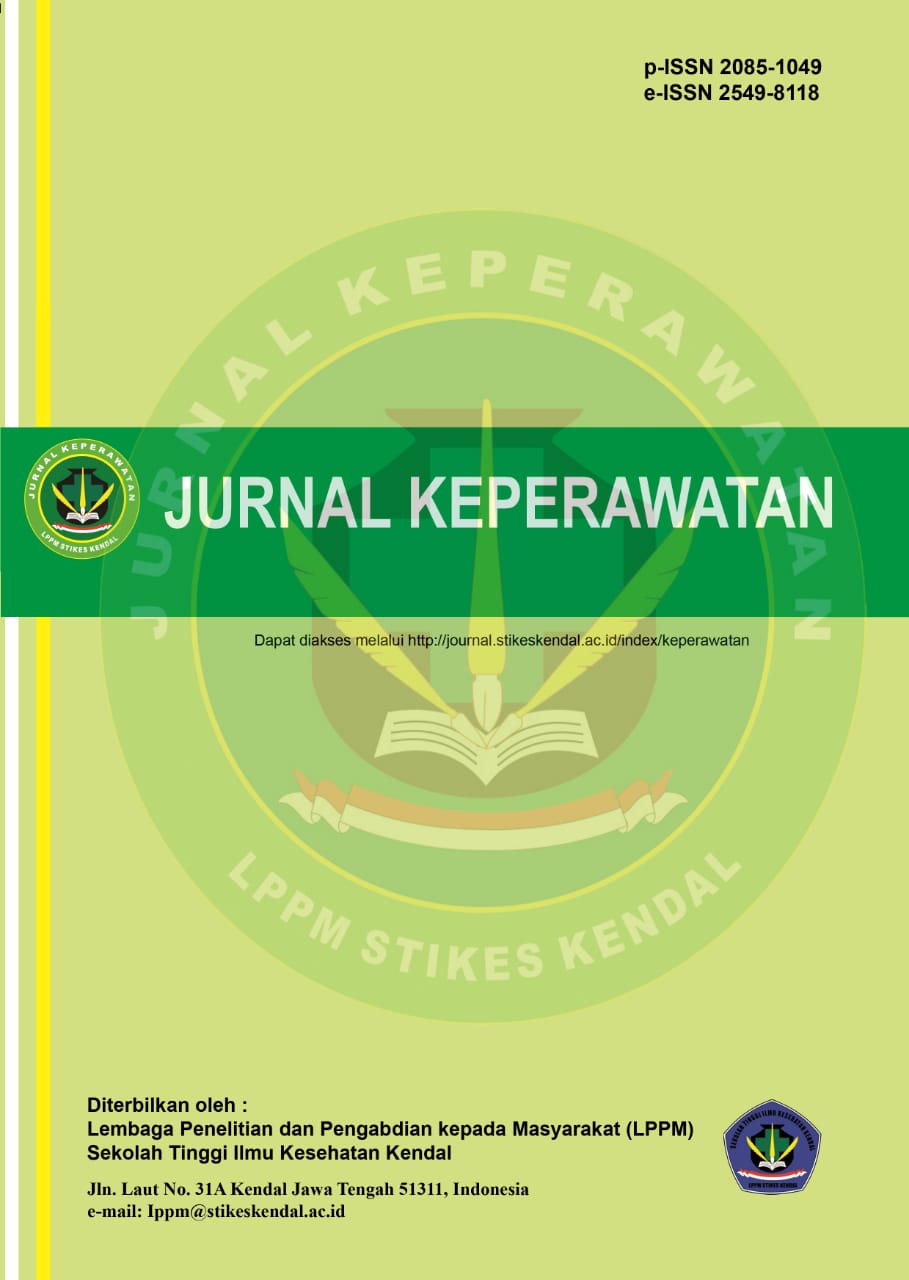Analysis of Factors Related to the Stress Level of High School Students Facing the Covid-19 Endemic Era
DOI:
https://doi.org/10.32583/keperawatan.v15i4.2067Keywords:
covid-19, endemic, high school students, stressAbstract
Coronavirus Disease (COVID-19) is an infectious disease that attacks the respiratory system with its spread quite quickly and widely and the efforts made by the Indonesian government by implementing the Large-Scale Social Restrictions (PSBB) policy. The decrease in the incidence of Covid-19 in 2022 has led to changes in learning policies in schools that can increase the risk of stress in adolescents. This study aimed to analyze the relationship between age, sex, vaccine history, academic achievement, length of study, knowledge, attitudes, behavior, and screen time with stress levels in high school students. The study population was high school students from 4 schools in Surakarta and the sample used in this study was 605 respondents and was selected based on purposive sampling techniques. Data collection techniques using questionnaires and data analysis using Chi Square test. The results showed a relationship between sex (POR 2.619 CI: 1.881-3.647), knowledge (POR 0.691 CI: 0.492-0.970), behavior (POR 1.509 CI: 1.086-2.097), and there was no relationship between age, vaccine history, academic achievement, length of study, attitude, screen time with high school students' stress levels. High school students who are female, have less knowledge and behave less well are at risk of experiencing more severe stress. So it is necessary to provide accurate information about Covid-19 to high school students so that they can understand and contribute to making good Covid-19 prevention efforts.
References
Ahmad, Z. (2021). Praktis Covid-19 Patogenesis, diagnosis dan tatalaksana (2nd ed.). FK Unsri Palembang.
Arifah, I., & Bagus Faisal, I. (2023). Mobilitas Penduduk dan Kasus Positif Covid-19 Pulau Jawa dan Bali Sebelum dan Selama PPKM Jawa-Bali. Jurnal Kesehatan, 16(2), 115–126. https://doi.org/10.23917/jk.v16i2.2049
Aulia, D. A. (2019). Faktor-faktor yang Mempengaruhi Adiksi SMartphone pada Remaja [Skripsi]. Universitas Islam Negeri Syarif Hidayatullah.
Azzahra, S., Andriani, D. A., Yusnanda, B., Yusuf, J. N., & Masnina, R. (2023). Inovasi Mendengarkan Musik Tingkilan Kutai Untuk Terapi Stress Pada Siswa Yang Akan Menghadapi Ujian Tulis Berbasis Komputer. Jurnal Kesehatan, 16(1), 73–81.
Brizendine, L., Cahyati, A., & Satrio, M. (2007). The Female brain mengungkap misteri otak perempuan (A. Cahyani, Ed.; 1st ed.). Ufuk Press.
Cohen, S. (1994). PERCEIVED STRESS SCALE Evidence for Validity: Higher PSS scores were associated with (for example). www.mindgarden.com
D’prinzessin, C. A. (2021). Hubungan Tingkat Pengetahuan Tentang Covid-19 terhadap Tingkat Stres dan Kecemasan pada Mahasiswa Farmasi Universitas Sumatera Utara Angkatan 2017 [Skripsi]. Universitas Sumatera Utara.
Endrayanti, R., Febriyanti, W., Sari, I. A., & Gita, A. P. A. (2021, May 29). Hubungan antara Pengetahuan dan Sikap Penggunaan Gadged dengan Kelelahan Mata Mahasiswa FIK UMS masa Pandemi Covid-19. Prosiding Seminar Nasional Kesehatan Masyarakat Universitas Muhammadiyah Surakarta 2021.
Graber, R., Pichon, F., & Carabine, E. (2015). Psychological resilience: State of knowledge and future research agendas. Overseas Development Institute.
Gunawan, I. A. N., Suryani, & Shalahuddin, I. (2022). Dampak Penggunaan Media Sosial Terhadap Gangguan Psikososial Pada Remaja: A Narrative Review. Jurnal Kesehatan, 15(1), 78–92. https://doi.org/10.23917/jk.v15i1.17426
Infeksi Emerging Kemenkes. (2023, November 13). Peta Sebaran Covid-19. Https://Covid19.Go.Id/Peta-Sebaran.
Kaplan, H. I., Sadock, B. J., Grebb, J. A., & Kusuma, W. (1997). Sinopsis Psikiatri Ilmu Pengetahuan Perilaku Psikiatri Klinis Jilid II. (7th ed.). Erlangga.
Kementerian Kesehatan RI. (2020). Pedoman Kesiapsiagaan Menghadapi Coronavirus Disease (COVID-19) (L. Aziza, A. Aqmarina, & M. Ihsan, Eds.). Direktorat Jenderal Pencegahan dan Pengendalian Penyakit (P2P).
Kwon, M., Kim, D.-J., Cho, H., & Yang, S. (2013). The Smartphone Addiction Scale: Development and Validation of a Short Version for Adolescents. PLoS ONE, 8(12), e83558. https://doi.org/10.1371/journal.pone.0083558
Lee, E.-H. (2012). Review of the Psychometric Evidence of the Perceived Stress Scale. Asian Nursing Research, 6(4), 121–127. https://doi.org/10.1016/j.anr.2012.08.004
Legiran, Azis, M. Z., & Bellinawati, N. (2015). Faktor Risiko Stres dan Perbedaannya pada Mahasiswa Berbagai Angkatan di Fakultas Kedokteran Universitas Muhammadiyah Palembang. Jurnal Kedokteran Dan Kesehatan, 2(2), 197–202.
Mahmudah, N., & Purnamasari, N. (2023). Pengaruh Konten Tiktok terhadap Tingkat Stres pada Remaja Akhir. Jurnal Pendidikan Tambusai, 7(1), 778–786.
Mar’atussholihah, S. (2022). Hubungan Perilaku Anak Broken Home dengan Tingkat Stres pada Siswa SMAN 9 Pandeglang dan SMKN 6 Pandeglang [Skripsi]. Universitas Islam Negeri Syarif Hidayatullah.
Missasi, V., & Izzati, I. D. C. (2019). Faktor yang mempengaruhi resiliensi. In F. Tentama (Ed.), Seminar Nasional Magister Psikologi Universitas Ahmad Dahlan. Universitas Ahmad Dahlan.
Muslim, M. (2020). Manajemen Stress pada Masa Pandemi Covid-19. Jurnal Manajemen Bisnis, 23(2), 199–209.
Permatasari, A., Nirwasita, S. F., Widyastomo, A., & Gita, A. P. A. (2021, June 21). Hubungan Pengetahuan dengan Pola Hidup Mahasiswa Kesehatan Masyarakat UMS 2018 sebelum dan selama Pandemi. Prodising Seminar Nasional Kesehatan Masyarakat Universitas Muhammadiyah Surakarta.
Pujiastuti, S. (2020, July 3). Dampak Covid-19 terhadap Pendidikan Anak. Https://Surveymeter.Org/Id/Node/568.
Ruhmadi, E., Suwartika, I., & Nurdin, A. (2014). Analisis Faktor yang Berhubungan dengan Tingkat Stress Akademik Mahasiswa Reguler Program Studi D III Keperawatan Cirebon Poltekkes Kemenkes Tasikmalaya. Jurnal Keperawatan Soedirman, 9(3), 173–189.
Susapto, D. (2018). Faktor-faktor yang Mempengaruhi Tingkat Stres pada Mahasiswa Tingkat Akhir Universitas Muhammadiyah Magelang 2018 [Skripsi]. Universitas Muhammadiyah Magelang.
WHO. (2023, November 13). WHO Coronavirus (COVID-19) Dashboard. Https://Covid19.Who.Int/?Adgroupsurvey={adgroupsurvey}&gclid=Cj0KCQiAjMKqBhCgARIsAPDgWlwv3oSj9Hn7njcM706thXZ_sSU58QwwKl9sineqqvEp_SCnfQvvx8caAr70EALw_wcB.
Wiciyuhelma, Ilmi, I. M. B., Fatmawati, I., & Sufyan, L. (2022). Hubungan Tingkat Stres Dengan Perilaku Konsumsi Gula Tambahan Berlebih Pada Remaja Putri. Jurnal Endurance, 6(2), 393–401. https://doi.org/10.22216/jen.v6i2.117
Wilujeng, C. S., Habibie, I. Y., & Ventyaningsih, A. D. I. (2023). Hubungan antara Jenis Kelamin dengan Kategori Stres pada Remaja di SMP Brawijaya Smart School. Smart Society Empowerment Journal, 3(1), 6. https://doi.org/10.20961/ssej.v3i1.69257
Downloads
Published
How to Cite
Issue
Section
License
Copyright (c) 2023 Jurnal Keperawatan

This work is licensed under a Creative Commons Attribution-NonCommercial-NoDerivatives 4.0 International License.



